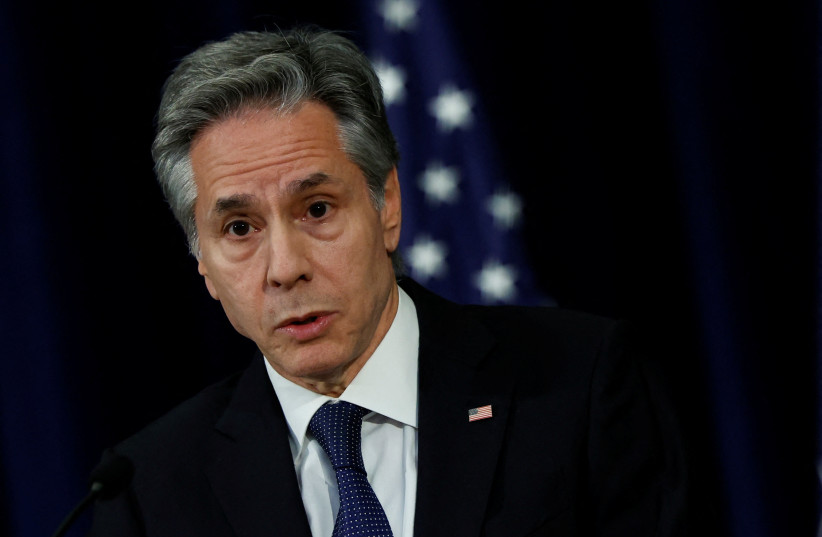US could recognize Palestinian state after Israel’s war in Gaza
The United States is engaged in ongoing “planning processes” on how best to advance the establishment of a Palestinian state, US State Department spokesperson Mathew Miller said, but stressed that this was not a policy change.
“Yes, we are actively pursuing the establishment of an independent Palestinian state with real security guarantees for Israel,” Miller told reporters in Washington on Wednesday.
‘We support the establishment of an independent Palestinian state, and we do a lot of work in the government to think about how to bring it about,” Miller said.
“The vast majority of options never usually get implemented,” he stated.
He spoke about those efforts when quizzed by journalists about a report on the Hebrew website Walla about such efforts.

Blinken to push through recognition of Palestinian state?
US Secretary of State Anthony Blinken ordered the US State Department to prepare staff work that will examine the possibility of American and international recognition of the state of Palestine the day after the war in Gaza, Walla reported citing two senior US administration officials.
Blinken also asked the State Department to submit proposals for what a “demilitarized Palestinian state” might look like based on various models from around the world, an official said.
A senior US official said that the war in Gaza and the efforts to find a diplomatic solution opened the way for a re-examination within the administration of many old paradigms in the policy of the United States towards the Israeli-Palestinian conflict. According to him, there are elements within the Biden administration who recommend changing policy and moving towards recognizing a Palestinian state as a first step in a renewed peace process and not as a last step that would be the result of negotiations between the parties.
There are several options for American action in this direction, the Walla report noted, ranging from a decision on US recognition of a Palestinian state to deciding not to veto a decision in the UN Security Council to accept Palestine as a full member of the organization, to encourage other countries in the West to recognize a Palestinian state.
A senior American noted that the examination of the issue is currently being carried out to suggest ways in which the two-state solution can be implemented in a way that will guarantee Israel’s security and not endanger it.
The official told Walla that the White House is aware of the State Department’s planned proposals, but emphasized that Blinken has not yet approved a new policy. A State Department spokesperson declined to comment on the matter.
A spokesman for the National Security Council at the White House said: “US policy for many years is that recognition of a Palestinian state should be the result of direct negotiations between the parties and not through unilateral recognition or through UN institutions. This policy has not changed.”
Blinken will meet with Israeli Strategic Affairs Minister Ron Dermer in Washington on Wednesday and will discuss with him the situation in Gaza, the issue of the day after, and the efforts to promote a normalization agreement with Saudi Arabia.
Dermer met today at the White House with National Security Advisor Jake Sullivan to discuss the same issues.
Reactions by political officials
National Unity MK Gideon Sa’ar said that “a Palestinian state would endanger Israel’s security and its future. It will be a radical state, a base for Islamist terrorism and an alliance with the most extreme elements that will permanently destabilize the region. I am convinced that the United States, our greatest friend, will not allow such a dangerous move.”
Jason D. Greenblatt, a former White House and Middle East Envoy under the Trump administration, said that it would be a “betrayal of Israel & make things much more complicated to achieve something real down the road that could benefit everyone.
“This effort should be stopped immediately. It will make an intransigent Palestinian leadership in Ramallah even more so, and embolden Hamas & other terrorists to continue their bloody rampage. Truly the definition of ‘an absolutely terrible idea.'”
Why is this move by the State Department important?
The fact that the US State Department is considering this possibility indicates a change in thinking within the Biden administration on an issue that is considered highly sensitive both internationally and domestically in the United States.
For decades, the policy of the United States has been to oppose the recognition of Palestine as a state – both bilaterally and in the UN institutions – and to make it clear that a Palestinian state will only be achieved through direct negotiations between Israel and the Palestinian Authority.
Israel has been strongly opposed for years to any recognition of a Palestinian state by individual countries and by UN institutions.
The US State Department conducted a similar review in the past, during US President Barack Obama‘s tenure, when the Palestinian Authority tried to obtain recognition of a Palestinian state through UN institutions. At that time, the Department prepared a document with policy proposals on the subject of recognizing a Palestinian state, but it was not seriously discussed within the administration.
In 2012, the UN General Assembly voted in favor of accepting Palestine as an “observer” state in the UN – similar to the Vatican – without accepting it as a full member of the organization.
British Foreign Secretary David Cameron said on Monday that Britain is considering recognizing a Palestinian state as part of an attempt to provide the Palestinians with a political horizon in the day after the war in Gaza.”We and our allies are examining the issue of recognizing a Palestinian state, including in the UN… This could be one of the things that will help make this process irreversible,” he said.
Jerusalem Post Staff contributed to this report.





Comments are closed.